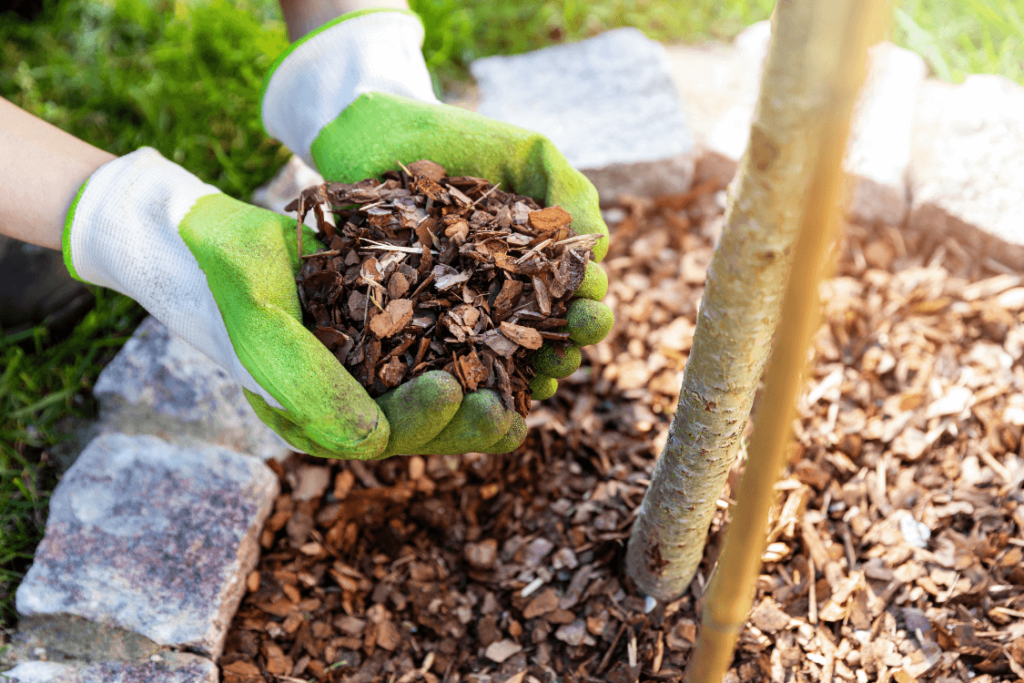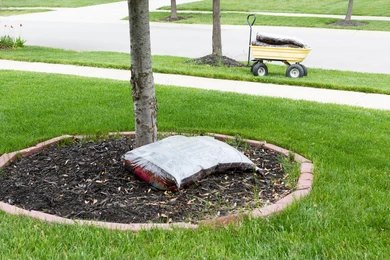Understanding Mulching
Mulching is an essential practice in landscape management, particularly for commercial properties. By applying a layer of material over the soil surface, mulch serves multiple functions that enhance the health and appearance of landscapes.
What is Mulching?
At its core, mulching involves covering the soil with a protective layer that can consist of various materials like wood chips, straw, or compost. This layer provides insulation, retains moisture, suppresses weeds, and improves soil quality.
Types of Mulch
In landscaping, understanding the types of mulch available is crucial:
- Organic Mulch: Includes natural materials such as wood chips, bark, leaves, straw, and compost. It decomposes over time, enriching the soil with nutrients and fostering microbial activity. Organic mulch is ideal for improving soil health and fertility.
- Inorganic Mulch: Comprises materials like stones, rubber chips, and geotextiles. While it doesn’t decompose to improve soil quality directly, inorganic mulch offers long-lasting weed suppression and erosion control. It’s often used in decorative applications or areas where minimal maintenance is desired.
Selecting the right type of mulch depends on specific landscaping needs and aesthetic preferences. Both organic and inorganic mulches play vital roles in maintaining healthy and attractive commercial landscapes.
For those interested in enhancing their lawn’s vibrancy alongside mulching practices, it’s worth exploring the 5 best grass types for a vibrant Ocala lawn, which can complement your mulching efforts effectively.
Benefits of Mulching in Commercial Landscaping

1. Moisture Retention and Irrigation Efficiency
Mulching is a strategic ally in moisture management for commercial landscaping, making it an indispensable practice for landscape success. By creating a protective barrier over the soil surface, mulch effectively reduces water evaporation rates. This barrier limits direct exposure to sunlight and wind, two primary drivers of moisture loss, ensuring that soil retains its moisture for extended periods.
The implications for irrigation systems are significant. With enhanced moisture retention, the need for frequent watering diminishes substantially. This reduction not only conserves water—a critical resource—but also translates into cost savings for commercial properties. Businesses can allocate fewer resources to irrigation without compromising the health of their landscapes.
- Improved Water Conservation: Less frequent irrigation schedules mean that landscapes require less water input over time, a vital factor in areas prone to drought or where water restrictions are in place.
- Cost-Efficiency: Reduced watering frequency leads to lower utility bills and operational costs associated with maintaining elaborate irrigation systems.
Adopting mulching practices supports an eco-friendly approach by minimizing water usage while maximizing plant health and vitality. By choosing this sustainable method, commercial landscapes achieve both environmental responsibility and financial prudence.
Moreover, the benefits of mulching extend beyond simple moisture retention; they encompass a comprehensive strategy towards optimizing irrigation efficiency and nurturing vibrant landscapes. For instance, some businesses have explored alternatives like water gardens, which can significantly reduce lawn maintenance tasks while creating captivating outdoor spaces.
With these advantages, it’s clear why mulching remains essential for commercial landscaping success, further emphasizing the importance of landscaping in commercial property.
2. Weed Control through Natural Means
Mulching offers a natural and effective solution for weed control, a key element in the success of commercial landscaping. By covering the soil surface, mulch blocks sunlight from reaching weed seeds, inhibiting their germination and growth. This reduction in weed proliferation helps maintain landscape aesthetics while preventing weeds from competing with desired plants for essential resources such as nutrients, water, and light.
In contrast to chemical herbicides, which can pose environmental risks and require repeated applications, natural weed suppression through mulching provides a sustainable alternative. Mulch not only reduces the need for chemicals but also fosters a healthier ecosystem within landscaped areas. The benefits of mulching extend beyond weed control; it contributes to the overall health of commercial landscapes by maintaining moisture retention and irrigation efficiency.
When comparing methods, using mulch for weed management aligns with integrated pest management strategies that prioritize eco-friendly practices. Choosing mulch over chemical solutions supports long-term sustainability goals in landscaping projects and enhances the resilience of plantings against environmental stressors. These advantages highlight why mulching is essential for commercial landscaping success, offering numerous benefits that contribute to thriving outdoor spaces without compromising environmental integrity.
3. Temperature Regulation and Soil Insulation Properties
Mulching plays a critical role in insulating soil temperatures, offering protection to plant roots against extreme heat or frost conditions. This insulation acts as a buffer that minimizes temperature fluctuations within the soil, safeguarding plant health during harsh weather conditions. When mulch is applied, it forms a barrier that helps keep the soil cooler during scorching summer months and retains warmth during winter, reducing the risk of root damage from frost.
For commercial landscaping projects, this temperature regulation significantly contributes to the vitality and health of plants. By maintaining stable soil temperatures, mulch prevents stress on plant systems, promoting robust growth and resilience. This aspect of mulching underscores its importance for ensuring optimal growing conditions across varied climates.
In some cases, incorporating landscaping rocks or gravel into the mulch can further enhance these temperature regulation benefits. These materials not only contribute to aesthetic appeal but also improve moisture retention and provide additional insulation for the soil.
- Benefits of Mulching: Stabilizes soil temperature, enhancing plant root protection.
- Commercial Landscaping Benefits: Supports plant health through effective temperature management.
- Moisture Retention & Irrigation Efficiency: Complements soil insulation by retaining moisture alongside managing temperature extremes.
The synergy between moisture retention and temperature regulation provided by mulching makes it an indispensable practice in achieving success in commercial landscaping endeavors.
4. Soil Health Improvement with Organic Mulch Benefits
Incorporating organic mulch into commercial landscaping projects brings significant benefits, particularly in enhancing soil health. As organic mulch materials, such as wood chips, straw, or compost, decompose, they release essential nutrients back into the soil. This nutrient addition fosters healthy plant growth, a crucial aspect of successful commercial landscapes.
Enhancement of Soil Structure and Fertility:
- Soil Structure: Organic mulches improve the physical structure of the soil by increasing its porosity and enhancing aeration. This leads to better root development and water infiltration, crucial for robust plant health.
- Fertility: Over time, decomposing organic matter enriches the soil with vital nutrients like nitrogen, phosphorus, and potassium. This nutrient enrichment supports sustainable plant growth without relying heavily on synthetic fertilizers.
Boosting Microbial Activity:
The decomposition process also stimulates microbial activity within the soil ecosystem. Beneficial microorganisms thrive in this enriched environment, breaking down organic materials into simpler forms easily absorbed by plants. This symbiotic relationship enhances overall soil fertility and contributes to a balanced ecosystem.
However, it’s important to note that while organic mulch provides many benefits, it can also create an environment conducive to certain issues such as fungal diseases if not managed properly. Fungal diseases can quickly spread and damage your lawn, so it’s important to take action before it’s too late.
Mulching is essential for commercial landscaping success due to these organic mulch benefits that contribute to improved soil health. Regular mulching practices ensure that landscapes remain vibrant and sustainable, ultimately reducing maintenance costs and promoting environmental stewardship.
5. Erosion Prevention and Soil Stabilization Strategies
Mulch is essential for preventing erosion and stabilizing soil, particularly in commercial landscaping projects. During heavy rain, mulch acts as a protective barrier that absorbs the force of raindrops on the soil surface. This reduces soil movement and stops valuable topsoil from being washed away, ensuring the health of landscaped areas.
In areas where soil instability is a problem, mulching offers an effective way to control erosion. By keeping a layer of mulch over the soil, you improve surface stability, which is crucial for maintaining landscape features and avoiding expensive damage to commercial properties.
- Benefits of Mulching: Protects against soil erosion, maintains landscape integrity.
- Commercial Landscaping Benefits: Reduces maintenance costs by preventing soil loss and plant damage.
To understand why mulching is important for commercial landscaping success, it’s essential to recognize these benefits. By including regular mulching practices in your landscaping plan, you not only support moisture retention and efficient irrigation but also protect against erosion issues. The significance of using mulch goes beyond just looks; it plays a vital role in sustainable landscape management.
6. Enhance Aesthetic Appeal for Boosted Curb Appeal
A well-mulched landscape can dramatically transform the visual appeal of commercial properties, making it a vital component in enhancing curb appeal. By providing a polished and cohesive look, mulch creates an inviting environment that can attract customers and clients.
1. Visual Impact
The clean, uniform appearance of mulched areas serves as a backdrop that highlights plants and flowers, creating a striking contrast against the greenery. This neat presentation often results in increased perceived value of the property, which is a key aspect of how landscaping boosts home value.
2. Variety in Design
Different colors and types of mulch allow for creative design possibilities in professional landscaping projects. Consider options like natural wood chips, which offer a classic look, or colored mulches such as red or black to add visual interest and complement existing architecture or branding elements.
The choice of mulch type and color can be tailored to specific design goals, adding depth and texture to landscapes while serving essential functional roles. Embracing these aesthetic benefits highlights why mulching is not only practical but also pivotal for commercial landscaping success, ensuring properties leave a memorable impression.

Effective Mulching Techniques for Successful Implementation
1. How to Mulch Effectively: Best Practices to Follow
Mulching is essential for the success of commercial landscaping. To achieve the best results, it is important to understand and use effective mulching techniques. Here are some best practices to follow:
Depth Matters
Applying mulch at the recommended depth of 2 to 4 inches ensures sufficient coverage without suffocating plant roots. This thickness provides an adequate barrier against moisture loss and weed growth while allowing essential nutrients and water to penetrate the soil.
Frequency of Application
Regular mulching, typically once or twice a year, maintains its effectiveness in landscape management. Timing these applications strategically, such as during spring and fall, aligns with seasonal growth patterns and weather conditions.
Avoid “Mulch Volcanoes”
One common mistake in mulching is piling it high against tree trunks or plant stems, which can lead to rot and disease. Instead, create a slight gap around the base of plants to promote air circulation and prevent moisture buildup.
Selection of Materials
The choice between organic and inorganic mulches depends on specific landscaping goals. Organic options like wood chips or compost contribute nutrients as they decompose, enhancing soil health. Inorganic alternatives, such as gravel or rubber mulch, offer long-lasting solutions with minimal maintenance but lack nutritional benefits.
Consideration of Climate
Regional climate variations play a significant role in determining the appropriate type and timing of mulch applications. In hotter climates, light-colored mulches reflect sunlight, aiding temperature regulation; whereas darker mulches absorb heat, suitable for colder regions.
Integration with Existing Landscaping Plans
Mulching should complement existing landscape designs rather than overpower them. It’s important to match mulch types and colors with plant species, hardscapes, and other design elements for a cohesive aesthetic appeal.
Effective implementation of these techniques underscores why mulching is essential in commercial landscaping projects. By adhering to these guidelines, you ensure that your landscapes not only look visually appealing but also thrive under optimized growth conditions.
2. Commercial Landscaping Tips: Integrating Mulching into Overall Strategies
Implementing effective mulching techniques is crucial for achieving the best results in commercial landscaping. Proper application methods are key to ensuring that your landscape reaps maximum benefits from regular mulching practices. Knowing how to mulch effectively will make a significant difference.

1. Seasonal Considerations
Seasonal Considerations play a pivotal role in the success of your mulching applications. Timing these applications appropriately based on regional climate variations ensures that the mulch performs optimally throughout the year. For instance:
- Spring: Ideal for applying fresh mulch as it helps retain moisture during warmer months and suppresses weeds before they germinate.
- Fall: Adding mulch in autumn can protect plants from harsh winter conditions by insulating roots and preventing soil erosion. You can explore some essential fall and winter landscaping tips to maximize the effectiveness of your mulching during these seasons.
Adapting to these seasonal nuances allows you to integrate mulching seamlessly into your commercial landscaping strategies. By aligning with natural cycles, you enhance the landscape’s resilience and health.
Incorporating these commercial landscaping tips ensures that mulching is not just a standalone task but an integral part of a holistic strategy. This approach contributes significantly to the long-term success and sustainability of your commercial landscapes, marking another reason why mulching is essential for commercial landscaping success.
2. Incorporating Mulching into Holistic Strategies
If you’re looking for more specific advice tailored to Florida’s unique climate, consider seeking out resources like this guide on Florida lawn care which offers valuable insights on how to maintain your landscapes effectively throughout different seasons.
Conclusion: Embracing Regular Mulching Practices for Long-Term Success
Incorporating mulching into your commercial landscaping strategy is more than just a routine task; it is an investment in the long-term success of your property. By implementing regular maintenance activities and adhering to proper application techniques, you ensure that the landscape remains vibrant, healthy, and sustainable.
- Resource Conservation: Embracing these practices reduces water usage and minimizes reliance on chemical interventions.
- Plant Health and Aesthetic Appeal: Proper mulching supports robust plant growth while enhancing visual appeal, crucial for maintaining a professional image.
- Erosion Control and Soil Stability: Regular mulching fortifies the landscape against adverse weather conditions, ensuring soil integrity.
Embrace these practices as part of your commitment to sustaining a thriving commercial landscape. The right approach to mulching not only meets immediate needs but also lays the groundwork for enduring success.

